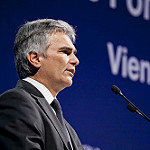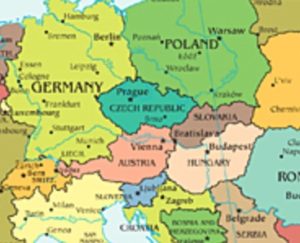Austria is getting a lot of the attention this month.

Former Federal Chancellor of Austria
A Seattle Times newspaper article on May 9, 2016 reported,
“Austria’s chancellor abruptly resigned Monday, a high-profile victim of Europe’s growing shift to the right, which threatens to push into obscurity some parties that have dominated post-World War II politics.”
The Deputy Chancellor filled in for him until a new chancellor was appointed.
On Sunday Austrians vote for a new President of the Republic of Austria. According to the Seattle Times story, the candidate representing Austria’s right-wing has a good chance to win.
“Freedom Party candidate Norbert Hofer … is the favorite going into the May 22 runoff against a former leader of the Green party running as an independent”.
That result, coupled with the general election to be held no later than 2018, could have an impact well beyond her borders. Austria was a significant player historically and might be in future events as well.
Her History
The Habsburg dynasty reigned over Austria plus other parts of Central Europe for centuries and, for a time, much of the rest Europe. Some credit the empire itself with lasting from 1483 to 1918. What remained around 100 years ago is known as the Austro-Hungarian Empire.
WWII leader of the Nazis — short for National Socialist German Workers Party — Adolf Hitler, was born and raised in Austria before he moved to Germany as a young man. Austria, Germany, and Hungary were allies in both World Wars.
Looking Ahead
An April 24, 2016 Agence France-Presse (AFB) story, published on a number of news websites a day later, contained the following statement.
“This is the beginning of a new political era,” the Freedom party leader, Heinz-Christian Strache, said after what constituted the best result at federal level for the former party of the late Joerg Haider, calling it “historic”.
The controversial life and death of Jörg Haider was extensively covered in a 2008 Economist Magazine article.
 Before the current migrant crisis, news analysts warned that Austria’s next door neighbor, Hungary, had become a far right dictatorship. Reports surfaced that World War II political organizations quickly reappeared there under their former names. See our 2014 articles on Hungary for July 28th and August 10th.
Before the current migrant crisis, news analysts warned that Austria’s next door neighbor, Hungary, had become a far right dictatorship. Reports surfaced that World War II political organizations quickly reappeared there under their former names. See our 2014 articles on Hungary for July 28th and August 10th.
The media now says Poland is starting to emulate and court Hungary. If Austria heads the same way, we may soon witness the emergence of a formidable ultra conservative political bloc.
Sunday’s outcome should indicate the strength of that trend.
May 23rd Breaking News: After an extremely close race, Norbert Hofer, the right-wing Freedom Party (FPO) candidate, lost; and Green Party’s Alexander Van der Bellen is the next president of the Republic of Austria. Results had been too close to call until absentee ballots were counted.
Photo credit: Chancellor by Heinz Tesarek for World Economic Forum; License: CC BY-NC-SA 2.0